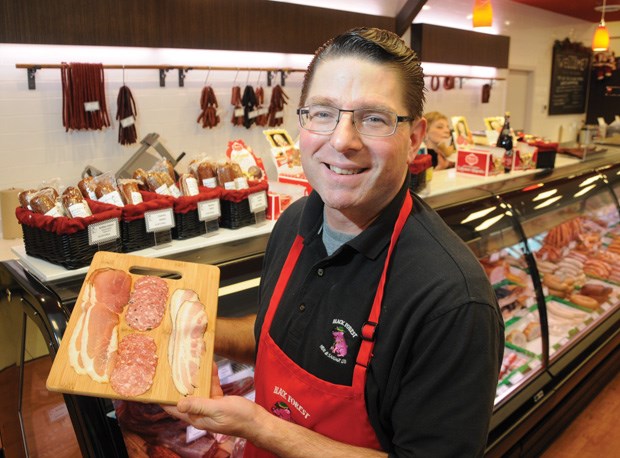My grandparents on my mother’s side of the family were both Latvian. They lived in the same apartment on Linton Street in Montreal’s Cote-des-Neiges neighbourhood for more than 30 years.
Cote-des-Neiges was, and remains, a vibrant community in which large immigrant populations settled, bringing with them traditions that helped define the city’s famous diversity. If I close my eyes I can somehow recapture the familiar food scents of their apartment, scents that changed with the seasons.
I always knew when my grandmother was making sauerkraut in the fall, for instance, as I could smell it half a block away. She did it the old fashioned way, brining the cabbage herself and pounding it into submission with a heavy wooden pestle, ensuring every shred was submerged. When cooking it for a meal, she would add fresh cabbage and goose fat, simmering the lot slowly, resulting in a deep brown, exceedingly tender dish with a nice balance of salty sourness and round, caramelized sweetness.
Latvians share many culinary traditions with other Northern and Continental European nations, including Germany. Walking around Black Forest Delicatessen one recent weeknight, I spied dozens of items I recognized from my grandparents’ refrigerator and pantry. Though my grandmother passed away a few years back, her cooking traditions remain vivid in my memory and Black Forest, with its shelves of berry preserves, mustards and pickles, coolers of cured meats and sausages, cold salads and smoked pates, helped to bring them to the fore.
Black Forest Delicatessen, located at Park Royal South, is the retail arm of Black Forest Meats & Sausage Ltd., a company that produces sausage, hams and other cured meats down on Harbour Avenue in North Vancouver. Production follows a strict quality code, resulting in meat products that have no fillers, have not been mechanically deboned and, with the exception of a clearly defined family of liver sausages, contain no animal organs.
I feel compelled to acknowledge that Black Forest, with its engaging retail space, trained staff and exceptional quality German meat specialties, is largely the work of master sausage maker Jurgen Burkhardt who, with his wife Nancy, founded the company. Sadly, Burkhardt passed away last year in a tragic accident.
If there is any solace whatsoever to be taken in the wake of this awful event, then it is most certainly in the legacy that he left behind. Black Forest is a one-of-a-kind specialist on the North Shore and those who maintain Burkhardt’s vision and continue to advance the business do so passionately and with the benefit of the mentorship that they received from him.
I finally emerged from the store with the following: a medium container of sauerkraut, a small container of German potato salad, thinly sliced veal tongue, fine smoked liverwurst, one each of Weisswurst, Nurmberger Bratwurst, Italian Bratwurst and Traditional Bratwurst, a small wedge of German butter cheese and a loaf of extraordinary Bauernbrot, or German farmer’s bread. I could scarcely wait to get home to tuck into this stuff. My selection of goods was $53.
I scored the three uncooked Bratwurst with a sharp knife and placed them into a medium pot on the stove, then emptied the sauerkraut overtop. My grandmother taught me this trick. At medium-low heat the natural liquid in the sauerkraut will slowly cook the sausages and infuse the cabbage with their own drippings. Scoring the sausages prevents them from bursting into an unappetizing mess in the pot.
Meanwhile, I arranged the other items on a large wooden board. Once the sausages were nearly cooked, I added the already-cooked Weisswurst (traditional Bavarian white sausage made of minced veal, back bacon, onion and spices) to heat up. I cracked a very cold bottle of Bavarian weissbier and was ready to roll.
The smoked liverwurst was my first bite. Exceedingly smooth and buttery in texture, it had a rich and round mouthfeel offset by pleasantly, but not overwhelmingly, smoky notes. On the slightly sour rye bread, the pate worked a treat. Next up was a side-by-side tasting of the various sausages.
The Nurmberger and traditional Bratwurst closely resembled each other in appearance, but the texture of each was notably different; the Nurmberger was learner, drier and coarser while the traditional had a succulent, decadent quality.
The Weisswurst was exceedingly airy and light, with subtle spicing and mild flavour. The Italian Bratwurst was a spicy number, with deep, fragrant notes of what I imagine was fennel and basil.
Black Forest’s sauerkraut, though doomed from the start to be judged against my grandmother’s, turned out to be very nice in its own right. The cabbage was tender but not mushy and revealed a slightly sweet quality, just enough to counteract any tendency of this unique specialty towards the acrid. Bits of smoky bacon studded the dish and offered a welcome smoky saltiness. The creamy potato salad with onion and just a touch of acidity in the dressing was a great starch complement.
I finished the meal with a thin slice of impossibly rich and creamy butter cheese on a hunk of the crusty bauernbrot, fully sated but nevertheless looking forward to leftovers the next evening.
Black Forest Delicatessen is located at 716 Main Street, Park Royal South. bfmeats.ca. 604-281-2697



